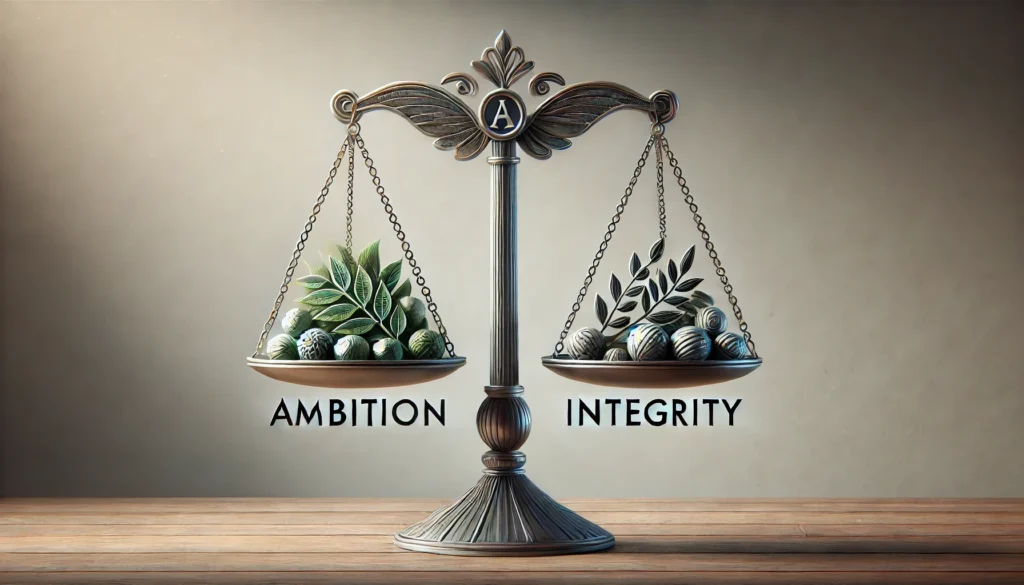The art of Ambition is the engine of progress, the force that propels individuals to achieve greatness, and the spark that ignites revolutions. Yet, history and literature warn us: ambition, left unchecked, can consume the ambitious. Balancing the pursuit of power with integrity, strategy, and wisdom is the challenge that defines true success. In this blog, we’ll explore how to channel ambition effectively, drawing insights from timeless classics like The 48 Laws of Power by Robert Greene, How to Win Friends and Influence People by Dale Carnegie, and other profound sources.

The Double-Edged Sword of Ambition
Ambition is often celebrated as a virtue. It drives innovation, creativity, and progress. But like a sharp blade, it must be wielded with caution. Consider Macbeth, Shakespeare’s tragic protagonist whose unchecked ambition leads to his downfall. The lesson is clear: ambition can either elevate or destroy.
Robert Greene, in The 48 Laws of Power, warns that the pursuit of power is fraught with danger. Law 1 states, “Never outshine the master,” reminding us that overt displays of ambition can provoke envy and sabotage. Dale Carnegie, in contrast, focuses on the softer side of influence, emphasizing that power is as much about relationships as strategy.
Key Takeaway: The art of Ambition is a force to be managed, not indulged recklessly. Understanding its risks and rewards is the first step to mastering it.

Lessons from Success: Applying Ambition Strategically
1. Rise Strategically, Like Napoleon Bonaparte
Napoleon Bonaparte exemplifies calculated ambition. Rising from a Corsican outsider to Emperor of France, Napoleon understood Greene’s Law 3: “Conceal your intentions.” He built alliances, studied his enemies, and acted decisively when the moment was right.
However, his fall reminds us of the perils of overreaching ambition. Ignoring Law 47, “Do not go past the mark you aimed for,” he stretched his empire too far, leading to his eventual exile.
Modern Lesson: Ambition without limits is self-destructive. Define your goals clearly and know when to stop.
2. Build Relationships, Like Oprah Winfrey
Oprah Winfrey, one of the most influential figures of our time, embodies Carnegie’s principle of winning people over. Her ability to empathize, listen, and genuinely connect with others propelled her to the top of the entertainment world.
Carnegie’s advice, “Make the other person feel important—and do it sincerely,” resonates in her story. Oprah’s ambition didn’t rely solely on her talent; it was her ability to foster trust and build networks that amplified her power.
Modern Lesson: Power isn’t just about strategy; it’s about people. Build genuine relationships and alliances.

3. Know When to Retreat, Like George Washington
George Washington’s ambition to lead a fledgling nation was tempered by his wisdom to relinquish power. By stepping down after two presidential terms, he exemplified Greene’s Law 36: “Disdain the things you cannot have; ignoring them is the best revenge.” His voluntary exit cemented his legacy and ensured the stability of the United States.
Modern Lesson: Sometimes, stepping back can be the most powerful move. Ambition tempered with restraint builds enduring respect.
Lessons from Failure: The Dark Side of Ambition
1. Overreaching Like Icarus
The myth of Icarus, who flew too close to the sun despite warnings, is echoed in countless real-life stories. Bernie Madoff’s ambition to dominate Wall Street led him to create one of the largest Ponzi schemes in history. His inability to heed Greene’s Law 5, “So much depends on reputation—guard it with your life,” led to his disgrace.
Modern Lesson: Reckless ambition can blind you to ethical boundaries and long-term consequences.

2. Alienating Allies, Like Julius Caesar
Julius Caesar’s assassination was the result of unchecked ambition that alienated his closest allies. He violated Greene’s Law 19: “Know who you’re dealing with—do not offend the wrong person.” His overreach cost him not only his power but his life.
Modern Lesson: Ambition that disregards the needs and fears of others invites betrayal.
The Subtle Arts of Influence and Power
To navigate ambition wisely, consider these timeless principles:
1. Master the Art of Timing
Greene’s Law 35, “Master the art of timing,” is crucial. Being ambitious doesn’t mean rushing. Successful individuals know when to act and when to wait.
- Example: Jeff Bezos built Amazon methodically, focusing on customer satisfaction and scaling gradually. His patience paid off.
2. Appeal to Self-Interest
Carnegie’s principle, “Talk in terms of the other person’s interest,” is invaluable. Whether negotiating, networking, or building alliances, understanding others’ motivations is key.
- Example: Elon Musk persuades teams and investors by aligning his ambitious visions with their goals, from Tesla to SpaceX.
3. Protect Your Reputation
As Greene emphasizes in Law 5, reputation is a cornerstone of power. Ambition without credibility is doomed.
- Example: Warren Buffett, known for his ethical investing and transparency, has safeguarded his reputation, making him a trusted figure in finance.

Ambition with Integrity: A Modern Approach
The modern world demands a more nuanced approach to ambition. Here are actionable steps to balance power and principle:
- Define Your Purpose: Why are you ambitious? Align your goals with values that inspire others.
- Cultivate Emotional Intelligence: Power is as much about managing emotions as strategies. Empathy and self-awareness are indispensable.
- Seek Mentorship: Learn from those who’ve mastered ambition. Their wisdom can help you avoid pitfalls.
- Embrace Failure as Feedback: Ambition often involves risks. Use setbacks as learning opportunities.
- Practice Gratitude: Celebrate small victories and acknowledge those who support your journey.
Quotes to Inspire and Caution
- “Power is not what you have but what others think you have.” – The 48 Laws of Power
- “You can make more friends in two months by becoming interested in other people than in two years by trying to get other people interested in you.” – How to Win Friends and Influence People
- “Ambition is a dream with a V8 engine.” – Elvis Presley

Conclusion: The Art of Balancing Ambition
Ambition is neither inherently good nor evil. It is a tool, and like any tool, its impact depends on how it is used. Whether you aspire to be a leader, innovator, or influencer, remember that power must be pursued with wisdom, restraint, and integrity.
By learning from history, embracing the principles of timeless works, and tempering ambition with humanity, you can achieve greatness without losing yourself in the process. Pursue your dreams, but never forget: the most enduring legacy is built on character as much as achievement.
Consider reading best of our articles:
For those in search of deeper insights and broader perspectives, you’re in the right place. Explore our curated list of must-read articles:










































